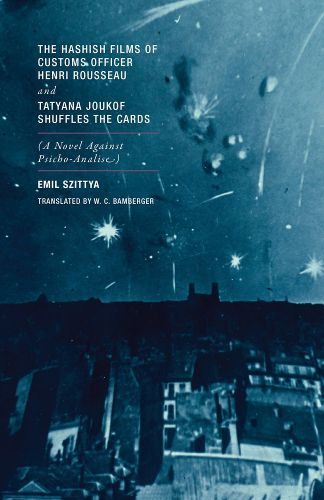Readings Newsletter
Become a Readings Member to make your shopping experience even easier.
Sign in or sign up for free!
You’re not far away from qualifying for FREE standard shipping within Australia
You’ve qualified for FREE standard shipping within Australia
The cart is loading…






For devotees of Dada and Surrealism, this outlandish, unconventional collection of prose poems amplifies a formerly invisible voice of European modernism
Emil Szittya's earliest known work of significance, The Hashish Films of Customs Officer Henri Rousseau and Tatyana Joukof Shuffles the Cards, was published in German in Budapest in 1916, yet it portrays the hallucinatory Paris in which the author had chosen a temporary dwelling at that time. Prose poems for lack of a better word, Szittya's "hashish films" were almost lost to time but can now be recognized as similar to the work of Blaise Cendrars and Guillaume Apollinaire. They nevertheless reflect the author's lifelong refusal to ally himself to any literary or artistic movement. It is a strange literary work as international and untethered as the author himself had been, a symbolic map of Montparnasse that incorporated the visual world of the painters around him. Emil Szittya was the most established pseudonym of the Hungarian-born Adolf Schenk (1886-1964). A vagabond in both his writing and his practice, his life intersected with notable names throughout Europe in the years of high modernism. Schenk eventually settled in Paris, fighting in the Resistance and working at the cafe Les Deux Magots before dying of tuberculosis.
$9.00 standard shipping within Australia
FREE standard shipping within Australia for orders over $100.00
Express & International shipping calculated at checkout
For devotees of Dada and Surrealism, this outlandish, unconventional collection of prose poems amplifies a formerly invisible voice of European modernism
Emil Szittya's earliest known work of significance, The Hashish Films of Customs Officer Henri Rousseau and Tatyana Joukof Shuffles the Cards, was published in German in Budapest in 1916, yet it portrays the hallucinatory Paris in which the author had chosen a temporary dwelling at that time. Prose poems for lack of a better word, Szittya's "hashish films" were almost lost to time but can now be recognized as similar to the work of Blaise Cendrars and Guillaume Apollinaire. They nevertheless reflect the author's lifelong refusal to ally himself to any literary or artistic movement. It is a strange literary work as international and untethered as the author himself had been, a symbolic map of Montparnasse that incorporated the visual world of the painters around him. Emil Szittya was the most established pseudonym of the Hungarian-born Adolf Schenk (1886-1964). A vagabond in both his writing and his practice, his life intersected with notable names throughout Europe in the years of high modernism. Schenk eventually settled in Paris, fighting in the Resistance and working at the cafe Les Deux Magots before dying of tuberculosis.